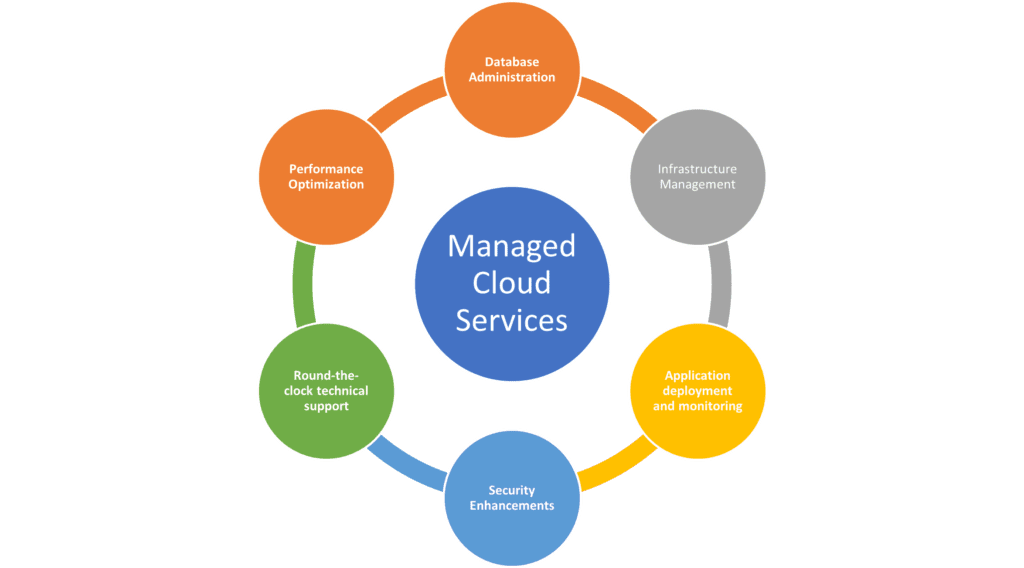In today’s digital landscape, cloud computing has become a driving force for business growth, innovation, and operational efficiency. However, managing a cloud environment can be complex and resource intensive. That’s where managed cloud services come in, offering comprehensive solutions and support to help organizations efficiently manage their cloud-based resources. By partnering with a managed cloud services provider, businesses can tap into the full potential of the cloud while leaving the complexities of cloud management to the experts.
Definition and scope of managed cloud services
Managed cloud services refer to the comprehensive range of solutions and support offered by third-party providers to assist organizations in efficiently managing their cloud-based resources. It involves outsourcing the management and control of a client’s cloud platform, including tasks such as migration, maintenance, optimization, and ongoing monitoring.

The scope of these services can vary widely, but typically includes some or all the following:
- Migration: Managed cloud service providers can help you migrate your existing workloads to the cloud, or they can help you build new applications and services in the cloud.
- Configuration: Managed cloud service providers can help you configure your cloud resources, such as servers, storage, and networking.
- Optimization: Managed cloud service providers can help you optimize your cloud resources for performance, cost, and security.
- Security: Managed cloud service providers can help you secure your cloud environment, including implementing security policies, managing access controls, and monitoring for threats.
- Maintenance: Managed cloud service providers can help you maintain your cloud environment, including patching, updating, and monitoring for performance issues.
- Backup and disaster recovery: Managed cloud service providers can help you create and manage backup and disaster recovery plans for your cloud environment.
Why to collaborate with Managed Cloud Services Providers
Cloud computing has become an essential part of modern business. It offers a number of benefits, such as scalability, flexibility, and cost-effectiveness. However, managing a cloud environment can be complex and time-consuming. This is where managed cloud service providers (MCSPs) come in.
MCSPs are companies that specialize in managing cloud environments. They offer a range of services, such as migration, configuration, optimization, security, and maintenance. This allows organizations to focus on their core business activities and leave the management of their cloud environment to the experts.
MCSPs can bridge the gap between organizations and the cloud infrastructure by understanding the needs of the organization and the capabilities of the cloud infrastructure and translating these needs and capabilities into a solution that meets the organization’s requirements. MCSPs also play a role in ensuring that cloud solutions are aligned with the organization’s business requirements and goals.
There are several reasons why organizations need to collaborate with MCSPs. Here are some key ones:
- Lack of internal expertise: Many organizations do not have the internal resources or knowledge to effectively manage a cloud environment. MCSPs can provide this expertise, freeing up internal resources to focus on other priorities.
- Cost savings: These providers can help organizations save money on cloud computing costs. They have established relationships with cloud providers and can negotiate better pricing on behalf of their clients.
- Scalability and Flexibility: Another advantage of using an MCSP is the scalability and flexibility they offer. As the business grows and expands, its cloud infrastructure must keep pace. With an MCSP, it is possible to quickly scale cloud resources up or down as needed, ensuring that businesses only pay for what they use. This flexibility allows them to respond quickly to changing market conditions, seasonal fluctuations, or unexpected events.
- Improved security: MCSPs have a deep understanding of cloud security best practices and can help organizations implement these practices effectively. They can help with tasks such as setting up firewalls, implementing access controls, and monitoring for potential security threats. By leveraging the expertise of MCSPs, organizations can reduce the risk of data breaches and other security incidents.
- Increased uptime: MCSPs offer 24/7 monitoring and support for cloud environments, ensuring that any issues are detected and resolved promptly. This proactive approach reduces downtime and improves the availability of applications and services, leading to better productivity and customer satisfaction.
When considering collaboration with an MCSP, here are some important points organizations must keep in mind:
- Define needs and requirements: Before choosing an MCSP, businesses must clearly define the specific services they need, and the level of support required. This will help them narrow down their options and select a provider that aligns with your business objectives.
- Compare different MCSPs: Businesses must take the time to compare various MCSPs in terms of pricing, services offered, and the level of support provided. Consider their track record and experience in managing cloud environments to ensure they have the expertise as required.
- Seek references from current customers: Organizations can request references from existing customers of the MCSPs they are considering. Hearing about past experiences will give businesses valuable insights into the quality of service they can expect.
To know more on how to choose an MCSP, check out this article.
Managed cloud services can be adopted at various stages of the cloud solution lifecycle. Whether a business is in the initial stages of cloud adoption or has an established cloud infrastructure, managed cloud services can be leveraged to enhance the cloud environment’s performance, security, and overall management.
In the rapidly evolving digital landscape, managed cloud services act as catalysts for growth and innovation, empowering businesses of all sizes to harness the full potential of the cloud while mitigating risks and maximizing performance. The cloud is transforming the way businesses operate, and managed cloud services are the key to unlocking its full potential.
Read next: 10 latest multi-cloud trends that service providers should know








